Salon Booth Rental vs Commission | Pros & Cons
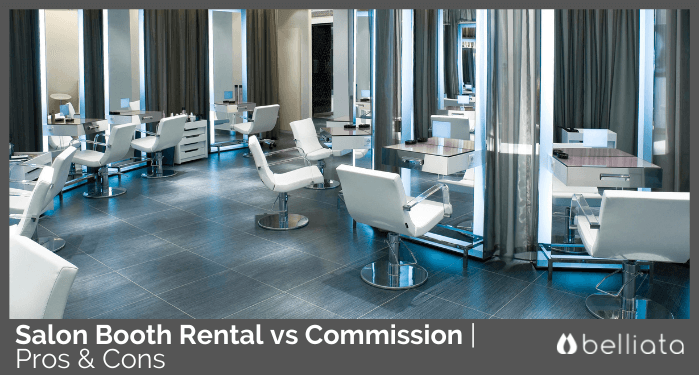

Salon booth rental vs commission… which one is better for you?
Whether you’re running a salon business or working as a stylist, you’ll need to decide which business model you’re most comfortable with.
Maybe you want to profit from the payments made by booth renters or offer commission-based salon incentives on services and retail sales to your own team of stylists.
It’s a major decision.
With chair rentals, each booth renter is essentially self-employed and just renting a booth. Owners will do less management work but have less say in what these tenants do.
Business owners who offer minimum wage or a pre-negotiated base pay to each employee on the team stand to make a lot of money on stylists’ services and commission-based sales. They also do everything else that a manager does.
There are pros and cons to each business approach.
Ultimately, you (and your hair stylists) should decide based on your ambitions, experience, and skills.
Please Note: This article is meant to offer guidance only. For the most up-to-date information about booth rentals or commission policies, always check your local labor laws.
We offer some tips for salon owners and managers on how a commission-based salon vs booth rental approach works, as well as some average rates and the advantages and disadvantages of booth rent vs commission-based salons.
What is a booth rental salon, and how does a booth rental salon work?
A booth rental salon business model is pretty straightforward. Sometimes, it’s also called “chair rental.” The salon owner is essentially a landlord, and booth renters pay to use your facilities.
Each independent stylist manages their own clients, revenue and schedule. You just provide the basics such as the chair, utilities, and whatever facility amenities and tools you’ve agreed on in your contract.
How do booth rental salons make money? That’s easy - the salon owner is paid a regular rent, either each week or by the month by each booth renter.
It’s a completely different environment than a salon business that acts as an employer and pays each hair stylist a commission on each job.
Renting a chair or space to stylists means you’re not their manager at all. They see their own clientele, pay for their own benefits (such as health insurance and education/ training) and manage their own career and marketing when they’re renting a chair.
This approach leaves you free to either run your own salon business as a stylist, or simply maintain the salon and make a profit each week/ month when the people who rent a booth from you pay rent.
This way, you’re basically guaranteed an income from each of your many paying stylists, no matter how many (or how few) people they see or what products they sell, because your money comes from renting out each chair.
So, is booth rent better than commission? It depends on the rent and the commission (as well as the success of each stylist behind the chair). You can make a good amount of money using each strategy, if you manage it well.
The choice between chair rental vs commission salon models depends a lot on your needs, ambitions and the level of free time that you have to manage your business and stylists.
Let’s take a look at how commission works in the salon industry.
Maybe you’ve seen it done at other locations, or you’ve even worked and received commission in the past. But you’re still not sure exactly how a salon owner makes the process work.
When you’re running a commission based salon, you’re much more than a landlord renting to your stylists.
There are some benefits to this approach, such as more control and the potential to make more profits if each employee sells large amounts of retail products or takes many high-expense clientele for complex bookings,, but we’ll go into these in more detail later on.
Your career and role in this situation is much more complex, because your money comes directly from how many people each stylist sees and what products they sell.
Great. So how does commission work in a salon?
Essentially, stylists just get their money (a base salary plus commission) from the salon owner, instead of getting it directly from their clients when they complete each job.
Many stylists actually do quite well if they work enough hours and have a regular client base.
Each week or month, you’ll pay them a base salary (often minimum wage, but you may want to raise this for experienced stylists), plus a commission (this could range anywhere from about 15-30% or more, depending on pre-set targets and what you’ve negotiated with each stylist).
You’ll likely need to provide your team with benefits like health insurance, vacation pay and whatever else labor laws require. It’s also in your interest to help them build a clientele.
Your commission structure and the amounts paid to each employee behind the chair may affect your tax rates, so be sure to do your research and consult with a professional tax accountant when coming up with your plan.
Make sure to also check your local labor laws to ensure that you’re running a business that complies with their standards, as some states and countries have different rules about commission.
When you’re considering hair salon booth rental vs commission, you should remember that it’s not always a black-and-white question of salon booth rental or commission. Conditions can be different, and some even mix both models very effectively.
Here are some of the most common advantages and disadvantages.
Do not miss our post about salon employee handbook that will provide you information on how to get a wonderful salon's working team.
The conditions of each plan can vary widely between many locations and even salon owners- in fact, some even use a mixture of both models.
Here are some of the benefits and disadvantages of each strategy:
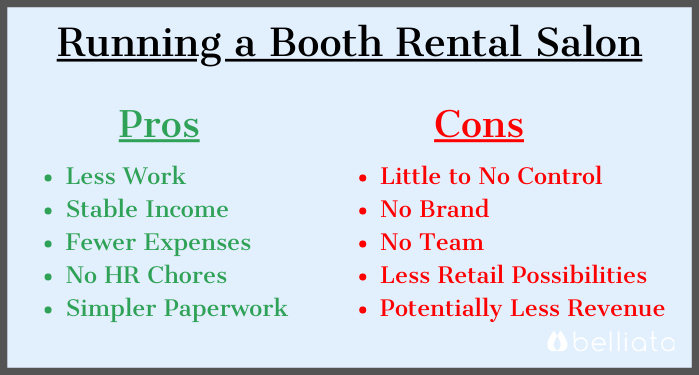
Chair rentals are often simpler for those starting out in the salon industry because you only have to worry about collecting rent money, finding a stylist to rent each space, maintaining the premises, etc.
That said, you’ll have a lot less say in what each booth renter does with their work hours, clients and individual space.
If you’re a “people person” and enjoy managing a team or working with others, you may find this strategy less enjoyable than other salon business models, too.
(+) Less work
(+) Stable income, with less risks (and less complex income tax)
(+) Fewer expenses (they pay for their own styling products, training, etc.)
(+) No HR chores or stress (you’re basically just a landlord and tenant)
(+) Simpler paperwork (employers often have a lot more forms to fill out than landlords)
(-) Little to no control (they set their own schedule and control their job)
(-) No brand (you’re not an employer with a hair salon- you’re renting spaces)
(-) No team (this can get lonely)
(-) Less retail possibilities (finding a way to incentivize booth renters to sell your products may be tricky)
(-) Potentially less revenue (they pay the same rent, even if their clientele increases)
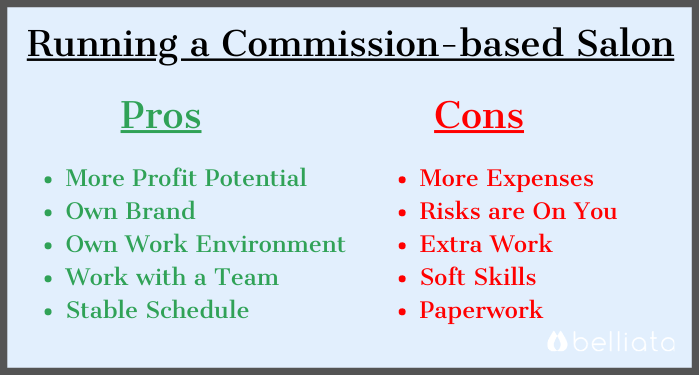
Running a salon business this way means that you’ll have to put in a lot more time and effort actually managing day-to-day operations.
You’ll also have to worry about things like taxes, labor laws, product inventory and employee scheduling hours. Of course, salon software for booth renters can help you to stay on top of many of these things.
There are many potential benefits to this model, though. You have the ability to control and build the success of your brand, and you can make large profits if your staff end up seeing a lot of clients or selling many products.
(+) More profit potential
(+) Can create your own brand
(+) Can create your own work environment
(+) Work with a team
(+) Can set a stable schedule (you decide when the salon is open and when it’s closed)
(-) More expenses
(-) All the risks are on you (sick leaves, no-shows, unsatisfied clients, etc.)
(-) Lots of extra work, from scheduling to marketing
(-) Requires much more soft skills
(-) Paperwork can be more complicated (you’ll need to worry about labor laws and taxes)
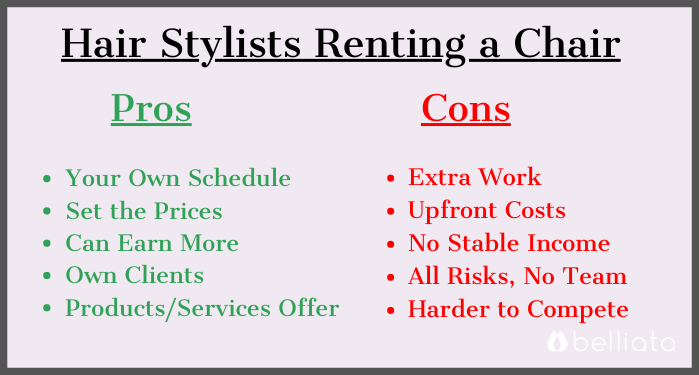
Many beauty professionals love the freedom that chair rentals give them. Plus, they get to keep all of their own profits and plan their schedules.
That said, there are a few drawbacks to this approach that you need to be aware of too, such as the extra work and costs that can be involved in essentially running your own mini-business.
(+) You can set your own schedule (who doesn’t love flexible work hours?)
(+) You set the prices
(+) You can earn more (you only pay rent, so you keep whatever profits you earn)
(+) You have your own clients (you can take them with you if you decide to leave)
(+) You choose which products/ services to offer (you choose training/ education, too)
(-) Extra work, from booking to finding new clients (and doing your own taxes)
(-) Extra upfront costs, from products and training to taxes and insurance
(-) No stable income (rent still needs to be paid, even in “slower” months, too)
(-) All risks are on you (getting sick, no-shows)
(-) Harder to compete with big names (you rely just on your own brand as a stylist)
(-) No team support
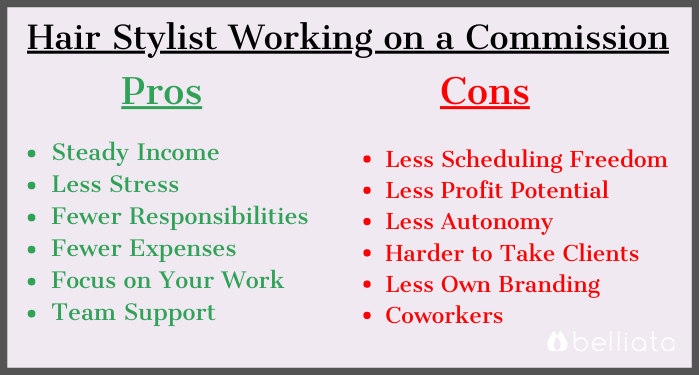
This approach gives people the security of working there as part of a group- you have access to a lot more resources and support (plus a regular wage, even when things are slow).
Still, some people don’t enjoy the lack of autonomy that comes with being part of a salon’s team and having to listen to a manager. It really depends on your own needs and preferences for your career.
(+) Steady income (even when there aren’t many clients coming in, you still get paid)
(+) Less stress (you’re not in charge of everything, so there’s less to worry about)
(+) Fewer responsibilities (including not having to do as many tax calculations)
(+) Fewer expenses (a salon often covers the basics, like tools and styling products)
(+) You can concentrate on your immediate work
(+) Training and a team to work with (it’s always nice to feel supported in your career)
(-) Less scheduling freedom
(-) Fewer possibilities to earn more (you share profits with the salon)
(-) Less autonomy (managers aren’t always fun to work with)
(-) Harder to take clients with you (if you decide to leave)
(-) Harder to grow your own brand
(-) Coworkers and “office politics” (if you’re not a “people person”, this can be tough)
Salon owners have to balance commission rates with profits, or else the business will not succeed. It may sound like common sense, but remember to look at your overall needs and each expense you have to pay when you set your commission rates.
Don’t forget that these might need to be renegotiated for more experienced stylists, too.
On average, a salon should expect to pay 35-40% of their total revenue back in payroll at most, and the commission rates that you offer need to reflect this.
At the end of the day, it’s not about the percentage, as much as it is about the stylists’ take-home salary and any benefits offered.
Commissions in the beauty industry will usually not be more than 35% (and often much lower than that). Feel free to pay them on a “scale” based on which targets your team members hit each week.
So, what is the average booth rental at a salon?
Again, that depends on location, the number of chairs available, and the popularity of the salon. If you want to rent a chair in a salon, prices will vary considerably between a major city center and a small town, for example.
Overall, you can probably expect to pay between $400 to $600 per month, but that also depends on what kinds of “extras” the salon facility offers (do they provide wifi or free parking, for example?).
If you’re a professional looking for a new location, or an owner trying to attract new tenants, make sure to do your homework and see what other salon owners in the area are offering, too.
So, what is the difference between booth rental and commission, and which one is right for me? There’s no one-size-fits-all answer that’s right for everyone. You’ll have to take a look at your own ambitions and needs and decide for yourself.
The good news is that many salons offer a mix of both models, so it can be easy to choose if you’re wondering how to go from commission to booth rent or vice versa.
In the end, salon booth rental vs commission salon models both have their advantages and their drawbacks. Whichever one you choose, make sure to get to know your location and what the other businesses nearby are offering. Then, you can be prepared to attract staff and clients.
A Career as a Hairstylist
https://books.google.com/books?hl=en&lr=&id=HteaPI3rpn
Small business employment
https://www.voced.edu.au/content/ngv:17303
Legal forms for starting & running a small business
https://books.google.com/books?hl=en&lr=&id=ltdUCwAAQBAJ&oi=fnd&p